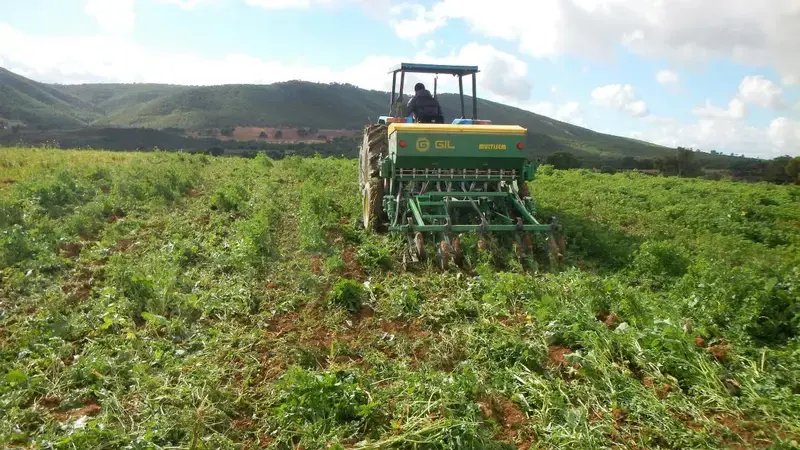A model farmer adopts conservation agriculture in North Africa

By Udo Rudiger and Hatem Cheikh Mhamed
Adnen Abdrabbou’s land in the El Krib region of northern Tunisia is semi-arid. The area sees some rain during the year, which makes it better than other parts of Tunisia. But finding enough water for irrigation has always posed a challenge. The area’s predominant farming systems are cereals and livestock.
In 1999, Abdrabbou parted ways with traditional farming systems. Conventional – and intensive – tillage caused soil erosion; and ammonium nitrate and phosphorus fertilizers were too expensive. He began practicing conservation agriculture instead – the essential elements of which are minimum tillage, permanent soil cover, and diverse crop rotation.
He opened up his farm for onsite conservation agriculture trials to ICARDA and three national agricultural institutes – l’Institut National de Recherche Agronomique de Tunis, l’Institut National Des Grandes Cultures, and l’Ecole Supérieure d'Agriculture du Kef.
For Abdrabbou, the institutes’ involvement provided confidence, and he became the first Tunisian farmer to pioneer the unknown technique. One of the trials has lasted nearly two decades, making it the most well-known on-farm trial of conservation agriculture in the country.
Promising returns
In 2006, just seven years into partially adopting the techniques of conservation agriculture, he noticed promising results. There were improvements in fertility and water retention in the soil. The yields were higher, too. That year, Abdrabbou bought his first no-till seeder. And he became involved in establishing the Sustainable Agriculture Association - known by its French acronym “APAD” - to disseminate the technology.
Today, all 140 hectares of his land are under conservation agriculture. He grows five or six crops for diverse crop rotation: his cereal crops are barley, wheat, and triticale; his legumes faba bean, alfalfa, and vetch. Growing forage is not only beneficial for crop rotation; it can also be used to feed small ruminants during the summer and winter periods when farmers are faced with a forage deficit.
In mixed farming systems, the feeding of livestock has been a major barrier to the large-scale adoption of conservation agriculture. In Tunisia, farmers usually use oat hay for feed. Abdrabbou started mixing oat with triticale and vetch, which is high in protein, and he has seen increased performance in his sheep.
Good agricultural practices should protect the environment and integrate crop and livestock production – Abdrabbou has done just that.
Conservation agriculture provides effective and natural solutions to conserve soil and water resources. Studies led by ICARDA and the Tunisian National Agricultural Research and Extension Systems (NARES) show that the elimination of tillage operations led to savings in fuel, time, and labor. Farmers used to believe that plowing soil and burning crop residues were the way to improve soil fertility and control pests. But as Abdrabbou learned, the opposite is true. Plowing makes the soil dry and sterile, especially in summer, when it is exposed to heat and light.
Having participated in numerous ICARDA and NARES training, Abdrabbou now trains farmers, students, and technicians. He has traveled the world for conferences on conservation agriculture, including in Brazil, France, India, Madagascar, Morocco, Portugal, South Africa, Spain, and Turkey. In the fall of 2018, Abdrabbou received an award from the Second African Congress on Conservation Agriculture for being a model farmer in North Africa.
ICARDA and its national partners are now working together on a project funded by the International Fund for Agricultural Development to integrate crop and livestock under conservation agriculture in North Africa and Latin America. And Abdrabbou is at the center of this initiative to optimize and scale out the practice of conservation agriculture.
“As farmers, we borrow the land for a short time, and we are responsible for taking care of it until we hand it over to our children and their children,” he said.
Udo Rudiger is an agricultural innovation specialist with ICARDA. Hatem Cheikh Mhamed is an agronomist with INRAT.

